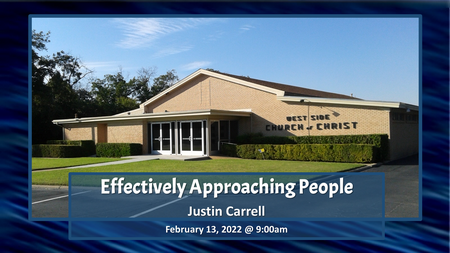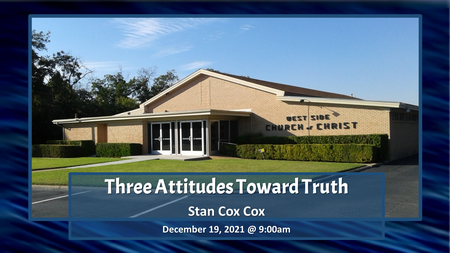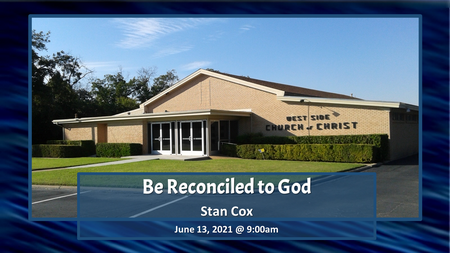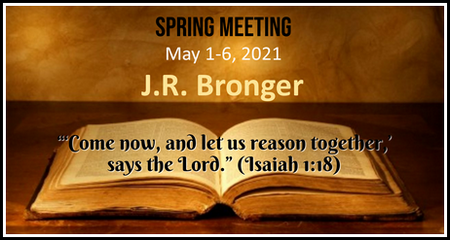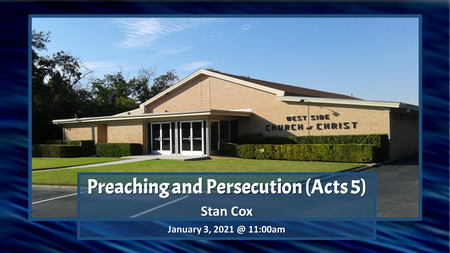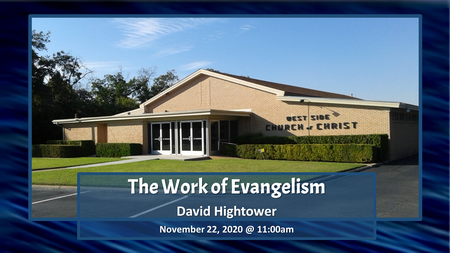Category: Preaching
Subject: Preaching
A Change in Circumstance
On the night of Jesus’ betrayal, many memorable words were said, that we speak of often. There is a short discussion Jesus had with his apostles, recorded in Luke 22:35-38, is less familiar to many.
“And He said to them, ‘When I sent you without money bag, knapsack, and sandals, did you lack anything?’ So they said, ‘Nothing.’ Then He said to them, ‘But now, he who has a money bag, let him take it, and likewise a knapsack; and he who has no sword, let him sell his garment and buy one. For I say to you that this which is written must still be accomplished in Me: “And He was numbered with the transgressors.” For the things concerning Me have an end.’ So they said, ‘Lord, look, here are two swords.’ And He said to them, ‘It is enough’” (Luke 22:35-38).
The previous occasion mention here by the Lord is the limited commission He gave to His apostles to go the lost sheep of the house of Israel, to preach to them “The kingdom of heaven is at hand” (cf. Matthew 10:5-15). As the apostles affirmed, they were well cared for as they witnessed and preached to a largely accepting audience. At that point in his ministry Jesus and His ministry was very popular, though even then He predicted a time when they would be persecuted for being His apostles (cf. Matthew 10:16-26).
Sermon: Effectively Approaching People
Justin shares some practical considerations as we seek to share the gospel of our Lord with those who need it.
The Patternists: Are Repeated Warnings Tedious?
In his letter to the Philippians, Paul clearly showed his respect for and confidence in this fine congregation. They were faithful, loving and active in the work of the Lord. There are few notes of admonition in his letter. His primary intent is to thank them for their fellowship and love.
However, he makes an interesting statement in the first verse of the third chapter. “Finally, my brethren, rejoice in the Lord. For me to write the same things to you is not tedious, but for you it is safe.” While there was no need for him to admonish them, there was a need for him to warn them again about things he had already addressed. In doing so, he contributed to their safety – “but for you it is safe.”
Continue reading “The Patternists: Are Repeated Warnings Tedious?” →
Sermon: Three Attitudes Toward Truth
Acts 17 shows a remarkable spectrum of responses to Paul’s teaching, ranging from open animosity, to dismissiveness, to belief and acceptance. What was behind such responses? How do men’s hearts differ?
Sermon: Philip and the Eunuch (Acts 8)
A discussion of Philip’s evangelistic efforts, and the conversion of the Ethiopian Eunuch, as found in Acts 8.
Sermon: Be Reconciled to God
An exegetical study of 2 Corinthians 5:12-21, explaining the importance of Paul’s ministry, and why we should all be striving for reconciliation with our God!
The Charge to Preach
Paul gave a serious charge to his ward Timothy, to preach the word! The charge was serious because it was made, “before God and the Lord Jesus Christ who will judge the living and the dead at His appearing and His kingdom” (2 Timothy 4:1).
Without forgetting in the context that Timothy was a young evangelist, I would like to emphasize how important it is to the Father and Son for disciples to share the gospel of our Lord. It is not worded as a suggestion, or even a plea. It is a charge!
The Almighty God in heaven, and His Son, to whom He gave the right to judge is giving an order to “Preach the word! Be ready in season, and out of season. Convince, rebuke, exhort, with all longsuffering and teaching” (4:2).
The world frowns upon any Christian who has the temerity to “proselytize.” However, that is exactly what God requires of us. “Go therefore and make disciples of all the nations, baptizing them in the name of the Father and of the Son and of the Holy Spirit, teaching them to observe all things that I have commanded you…” (Matthew 28:19-20).
Simply put, we take our marching orders from the Lord. And, as our general, He has been given absolute authority over us. We are to do His will, without hesitation or question. His marching orders are to “Go into all the world and preach the gospel to every creature” (Mark 16:15). Are we heeding the charge of our Lord?
Click below to…
Sermon: Spring Meeting, 2021 with JR Bronger
JR Bronger from Blue Springs, MO preached a wonderful series of gospel sermons for the West Side congregation, May 1-6, 2021:
Saturday PM: The Conversion of Saul (Acts 9)
- A discussion of the conversion of Saul of Tarsus. A religious terrorist who became a wonderful example of the saving power of God’s grace.
- Facebook Live Video of Sermon
Sunday 1st Service: Evangelizing the World
- In the first century, Christians were able to spread the gospel throughout the known world, despite opposition and challenges. If we have the same mindset today, we can be just as successful!
- Facebook Live Video of Sermon
Sunday Class: Successful Marriages
- Foundational teaching on the subject of marriage. Principles which, if followed, will guarantee strong marriages existing in accord with God’s desire.
- Facebook Live Video of Sermon
Sunday 2nd Service: The Hate of Christ and Christians
- The world hated Jesus Christ because of His mission and righteousness. He promised that the world would hate his followers as well. In our day such hate is prominent.
- Facebook Live Video of Sermon
Monday PM: Christians Are Running a Race
- A runner himself, brother Bronger uses the Hebrew writer’s imagery in Hebrews 12:1-2 to establish a few important truths regarding the race the Christian runs.
- Facebook Live Video of Sermon
Tuesday PM: A Rebel Returns
- A powerful lesson on rebellion and redemption, based on the Parable of the Prodigal Son in Luke 15. Young people need to hear this message!
- Facebook Live Video of Sermon
Wednesday PM: Do You Want to be Made Well?
- If you really wish for spiritual healing, you must stop thinking of yourself as a victim, stop blaming others for your failings, free yourself from fear and recognize the difference between wanting relief, and wanting a cure.
- Facebook Live Video of Sermon
Thursday PM: Hardening of Pharaoh’s Heart
- There were three responsible parties in the hardening of Pharaoh’s heart. God Himself with His demands. The wicked court magicians. And most prominently, Pharaoh himself.
- Facebook Live Video of Sermon
The Patternists: The Bearer of Bad News
Jeroboam was rewarded by God with the 10 tribes which made up the northern kingdom of Israel. He became their king, according to the prophet Ahijah, because the reign of Solomon led to Israel forsaking Jehovah, and engaging in idolatry, cf. 1 Kings 11:29-39. His tenure as king was conditioned upon his obedience to God. The prophet Ahijah shared with Jeroboam these words from God, “Then it shall be, if you heed all that I command you, walk in my ways, do what is right in My sight, to keep My statutes and My commandments, as My servant David did, then I will be with you and build for you an enduring house, as I built for David, I will give Israel to you” (38).
Jeroboam responded to Jehovah’s gift of the northern kingdom by rebelling against Him. Just as Solomon led Israel into idolatry, Jeroboam encouraged the northern Kingdom he ruled to worship gold calves he had fashioned for them.
Continue reading “The Patternists: The Bearer of Bad News” →
Sermon: Pierced to the Heart (Acts 2 & 7)
Speaker: Ian Tilley
Two sermons, two groups pierced to the heart (Acts 2 & 7), and yet two different responses to the gospel of Christ. We can’t determine the results of our preaching, it is simply our place to plant the seed!
Sermon: Preaching and Persecution (Acts 5)
Peter and the rest of the apostles were persecuted by the angry High Priest and council in Jerusalem (Acts 5). Their response to the persecution give us wonderful lessons we can apply to our own efforts to share the gospel.
Sermon: The Work of Evangelism
Speaker: David Hightower
This short invitation lesson is David’s first effort. David is a fine young Christian, and his lesson on the importance of Evangelism as a work of every Christian is worth a listen and viewing!
Entrusted with the Gospel

The apostle Paul considered himself a steward. God had given him responsibilities as an apostle, and he took those responsibilities seriously. He wrote to the Thessalonians, “But as we have been approved by God to be entrusted with the gospel, even so we speak, not as pleasing men, but God who tests our hearts” (1 Thessalonians 2:4). As he wrote on another occasion, “Let a man so consider us, as servants of Christ and stewards of the mysteries of God. Moreover it is required in stewards that one be found faithful” (1 Corinthians 4:1-2).
What is interesting about the Thessalonian text is how Paul defines faithful stewardship. “…even so we speak, not as pleasing men, but God who tests our hearts.” In the proclamation of truth it is important to please only one, God. That doesn’t mean that others will not be pleased, but that is not the mandate.
We need to understand this as well. When we preach God’s word, our intent must be to please Him. Whether or not men approve in the telling is not only not our concern, but not in any way within our control. Peter preached the gospel, leading to many conversions, (cf. Acts 2). Stephen preached the same gospel, leading to his own death (cf. Acts 7). Both pleased God in the telling. Jesus Himself had those who “heard Him gladly”, and those who put Him to death for what he had to say.
Do you want to be God’s faithful steward in the spread of the gospel? Then handle it in such a way as to please God, not men.
Click below to…
The Patternists: Support of the Preacher
In 1 Corinthians 9, the apostle Paul found it necessary to defend his right, as well as that of his preaching companion Barnabas, to receive material support in the pursuit of preaching the gospel.
This was in response to an “examination” by others, who apparently objected to his taking money and support from congregations. (It is interesting how possessive some brethren can be about money that belongs to the Lord!). His defense begins in verse 4.
“Do we have no right to eat and drink? Do we have no right to take along a believing wife, as do also the other apostles, the brothers of the Lord, and Cephas? Or is it only Barnabas and I who have no right to refrain from working? Who ever goes to war at his own expense? Who plants a vineyard and does not eat of its fruit? Or who tends a flock and does not drink of the milk of the flock?” (9:4-7).
Continue reading “The Patternists: Support of the Preacher” →
Pappy’s Bad Word
One interesting part of being a Pappy is that you may forget some of the “bad” words parents teach their children not to say. A couple of times I have used the word “stupid” in front of my granddaughters, and they have been scandalized! “Pappy, that’s a bad word!” So Pappy has to say he’s sorry, and promise not to say it again.
The word “stupid” is certainly an ugly word, and we generally are right to avoid it’s use. It is also an appropriate word to use from time to time. One such time is in describing a man who hates to be corrected.
“Whoever loves instruction loves knowledge, but he who hates correction is stupid” (Proverbs 12:1).
The Hebrew word that is translated stupid in the NKJV is ba’ar. It is translated “brutish” in older translations as a nod to its etymology. You have heard the insult “dumb cow” or “dumb as a cow”? Cattle are not known to be particularly smart animals. The Hebrew word is taken from a root which means to consume or eat cattle. If you are brutish, you are like a cow. In a word, stupid!
God’s people appreciate both His word, and those who are willing to reprove and rebuke in accord with that word. A person who is unwilling to take such correction is actually acting in a self-destructive manner. He is being stupid! It is not always comfortable or enjoyable to be corrected by someone more knowledgeable, but it is smart to listen.
Click below to…





